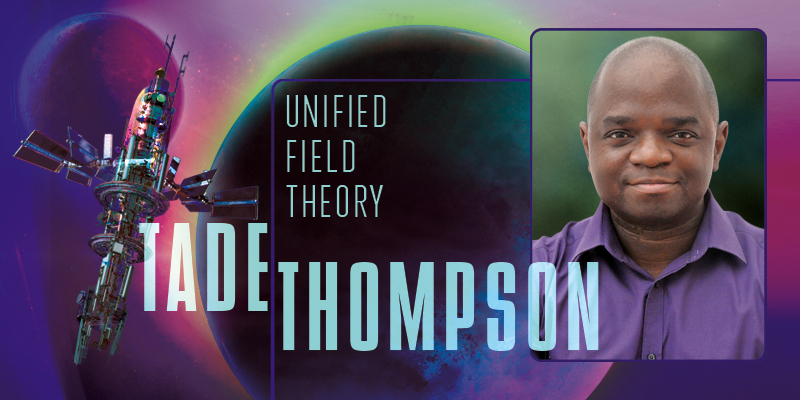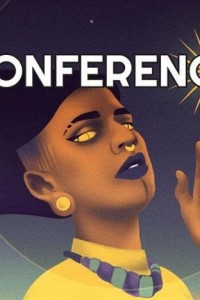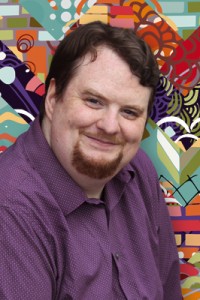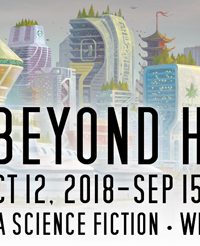Tade Thompson: Unified Field Theory

TADE THOMPSON was born in South London in the 1970s. He traveled a lot as a child due to his parents’ separation and his father’s work as a lawyer (some of which was behind the Iron Curtain). Thompson’s qualifications include medicine, psychiatry, and social anthropology, though he flirted with Industrial Chemistry in 1988. He has been a member of the Royal College of Psychiatrists since 2007.
He sold his first semi-pro SF story in 2005, and has published over 25 pieces since then. Novella The Murders of Molly Southbourne (2017) and sequel The Survival of Molly Southbourne (2019) were nominated for British Fantasy Awards and British Science Fiction Association Awards; the first was also a Shirley Jackson Award finalist. “The Apologists” (2016) was a BSFA nominee, and “Yard Dog” (2018) was a Theodore Sturgeon Memorial Award nominee. Some of his short work is collected in Household Gods and Other Narrative Offences (2020).
His debut novel was Kitschies Award winner Making Wolf (2015). Arthur C. Clarke Award winner Rosewater (2016) launched the Wormwood series, and was also a finalist for a BSFA Award, a Kitschies Award, and was first runner-up for the Campbell Memorial Award. The series also includes BSFA Award finalist The Rosewater Insurrection (2019) and Philip K. Dick Award nominee The Rosewater Redemption (2019). The trilogy as a whole was nominated for a Hugo Award for best series in 2020.
Thompson’s latest novel, space opera Far from the Light of Heaven, is out this month.
Excerpt from the interview:
“A lot of things brought the Wormwood Trilogy together for me. My thinking about it started in 2011. The first thing was a news story about these conjoined twins who could think each other’s thoughts. When I read that article, I thought it would be a good basis for telepathy, the idea that the brains were physically connected. I grew up loving all kinds of paranormal reported phenomena. I was really big into Bigfoot, aliens, everything – I ate all of that stuff up. When I have an idea that I want to put into a story, I like to have some kind of plausibility woven into it. I started ruminating on the idea. You couldn’t go around with your head actually connected to other people, but you could have a neuron connected – something that was microscopic. There would have to be a network in the air that you could connect your neurons to. People could have filaments projecting that would connect to those dots, and you could think each other’s thoughts. Where would the network come from? I got some inspiration from The Andromeda Strain – what if there were alien bugs in the air that were linking to each other? Okay, fine, but why? What’s the purpose of it? I decided the aliens, instead of kidnapping people from a farm in the American heartland and saying ‘Take us to your leader’ or something, would just take all the information stored in this network that’s already in the air. I kept working on the idea, but I didn’t have any characters to slot into that idea. One day I started thinking about two people I’d met. One was my younger brother, and the other was an actual criminal that had escaped from prison and was finding his way to the next thing – I gave him beer and something to eat, largely because I didn’t want him to beat me up. I had conversations with him, while he was waiting basically to move on. He was a thief, and he said he wasn’t violent – he was a sneak thief, and he started telling me things from his life. One of those stories made it directly into the book. He said once there was a mob trying to kill him, and he had to go into a rubbish dump to get away, and I used that story verbatim. I merged his character with my younger brother’s character, and as soon as I thought of those two people, Kaaro came to my mind as a character, fully formed with a backstory and everything. That’s how the whole thing started to coalesce with Rosewater. I already had opinions about mental colonization, so the whole thing came together at the same time. That’s when I started writing. It wasn’t just a cool science fiction idea, but something with personal meaning about our society – I had something to say. I’d already been thinking about those things. The story I sold to Ideomancer was called ‘The Mayhem Institute for Acquired Minds’, and it is actually set in the same world as Rosewater, about a decade before.
“I started writing it, got to 40,000 words, then I stopped. I started again, because I realized I’d started in the wrong place. I still had Kaaro in mind, but I told it from the perspective of someone else. Then I realized that it would be more meaningful if I told the story in first person. I wanted the reader to be reading Kaaro’s mind just as Kaaro was reading the minds of other people. Structurally, it’s a first-person narrative, but it’s not really, because Kaaro can read other people’s minds – we can tell what other people are thinking. So that was one of the ways I circumvented some of the weaknesses of the first-person narrative, specifically that you can only know the mind of the person narrating. The second thing I did was to fracture the narrative, because the younger Kaaro was similar to but different from the older version. It actually created two main characters, young Kaaro and old Kaaro, which, when interwoven, made it seem as if you were dealing with two different people.
“It’s a mistake when people give advice like ‘don’t do X’ or ‘don’t do Y,’ ‘don’t use a prologue,’ and all of that. Nah, I don’t care what you think. I realized that those things are actually immaterial – they don’t matter. What matters are the core aspects of storytelling. You must have a compelling story, a compelling character, and compelling situations, and the rest doesn’t matter. As long as it is compelling, people actually don’t care about things like chronology. You can tell it backwards, as long as people are invested in the character and want to know what’s going on. That’s where the craft comes into it. As long as you don’t torture the structure as a gimmick, and it’s actually serving the narrative, people will stay with it. Just maintain that flow. In Far from the Light of Heaven, for example, I wanted the pace of the book to match the pace of throwing a rock in the air: it rises, and then falls back to Earth with acceleration. I wanted it to speed up like a rock falling to the earth. My editor wasn’t quite happy with that, but I said, ‘Because it’s about space travel, this is what I want to do.’ Force equals mass times acceleration, and all that. This is the structure that I want to follow – it’s a setup and then it speeds downward. As writers or as artists, we should take those chances. We shouldn’t think that everything is restricted to one way of telling stories. There are as many ways of telling stories as there are people. People say every story’s been told, but the uniqueness comes from the individual telling. If a person is telling a story, they should be able to tell it individually. People have told murder stories, and stories about space stations and ships in orbit, ships failing, AIs taking control, all of these things have been done before. What you bring to a story is your individual self and your individual way of telling it.
“The other thing that’s important is the way we tell stories to each other when we are not being ‘writers’. When we are with friends, we tell stories back and forth in time. We sit down at a table and we’re eating and we’re laughing with family or friends and everything, and we say, ‘I’ll tell you what happened. Do you remember that person that I told you about at work three years ago who did this and this and this and this? Well, today they did this and this and this. And oh, I forgot to tell you this part. So this happened’ – and we have no problem following that story, even though it jumps around. That’s how we tell stories – we go back and forth. I have a big problem with people who have built an industry around a particular three-act story structure, like, ‘This is the way, because Joseph Campbell got this from God, and God told us to do it this way.’ I really get pissed off at Joseph Campbell’s stuff.
“Storytelling is a tradition in various cultures, and there are various storytelling traditions. Again, it speaks to intentionality. You have to know, when you’re writing a story, to which audience are you speaking? Because audiences are trained. Cultures are trained to do things or to imbibe things in particular ways, so audiences are trained and have certain expectations. If you get into a story and there’s a body immediately, you are trained to believe that it’s going to be a murder mystery. As soon as you write that setup, an expectation is immediately formed in the audience that by the time they get to the end, they’ll find out who killed this person and why. You’re setting up a promise in the beginning that is required to be fulfilled at the end, and if it is not fulfilled at the end, the story isn’t satisfying.
Interview design by Francesca Myman.
Read the full interview in the October 2021 issue of Locus.
 While you are here, please take a moment to support Locus with a one-time or recurring donation. We rely on reader donations to keep the magazine and site going, and would like to keep the site paywall free, but WE NEED YOUR FINANCIAL SUPPORT to continue quality coverage of the science fiction and fantasy field.
While you are here, please take a moment to support Locus with a one-time or recurring donation. We rely on reader donations to keep the magazine and site going, and would like to keep the site paywall free, but WE NEED YOUR FINANCIAL SUPPORT to continue quality coverage of the science fiction and fantasy field.
©Locus Magazine. Copyrighted material may not be republished without permission of LSFF.








